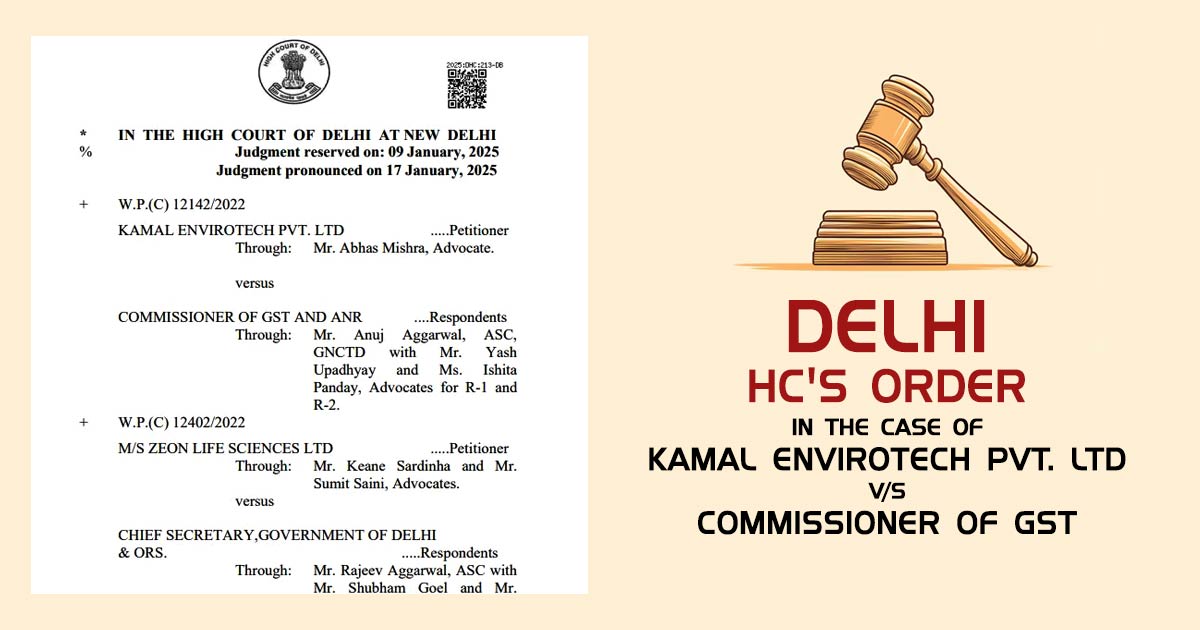
It was carried by the Delhi High Court that Section 129 of the Central Goods & Services Tax Act, 2017 which relates to the detention, seizure, and release of goods while in transit cannot be invoked for assessing penalties for minor breaches, like incomplete e-way bill.
A division bench of Justices Yashwant Varma and Harish Vaidyanathan Shankar carried that Section 129 cannot, merely by its non-obstante clause, be construed to have an overriding effect on Section 126 which prohibits tax officers from charging any penalty for minor violations of tax regulations or procedural requirements.
It was noted by the court that Section 129 starts with the non-obstante clause as it deals with a subject (detention and release of goods) which is not factored for in any other provision placed in the Chapter.
“In our considered view, the non-obstante clause in Section 129 cannot possibly be interpreted as being intended to override what had been specifically provided in Section 126 or annihilate the rules of guidance which stood embodied therein,” it added.
The court was dealing with the petition of the company contesting the demand of the GST demand u/s 129. It alleged that the goods of the applicant were being transported under an incomplete GST e-way bill.
It was claimed by the applicant that as there was no allegation of tax evasion or providing of the wrong data, the imposition of the penalty is arbitrary and statutory. It was their matter that the violation does count under the class of minor breaches and shall be controlled by Section 126 (general disciplines related to penalty).
The department argued that section 129 mentions a ‘statutory penalty’ that necessarily entails a levy and tax demand. It outlines the non-obstante clause of the Section and claims that the lack of mens rea/ intent to evade tax, shall not prevent a tax demand where goods are asked to be transported in the breach of the act.
The High Court at the outset shows disagreement with the Department’s assertion that section 129 makes a legal penalty. It laid on HDFC Bank Ltd. v. Commr. of Value Added Tax (2023) where the Supreme Court ruled that factors such as ‘guilt, dishonest conduct or acting in intended disregard of a binding obligation’ include circumstances in which the levy of a penalty in terms of a statutory provision would be explained.
Read Also: No Penalty U/S 129(3) When There is Clear Evidence of Intentional GST Evasion
Further, the court has rejected the Department’s contention that Section 129 is objected to overriding Section 126 under its non-obstante clause. Section 126, as per the court, eliminates from the scope of Section 129 mistakes of minor character, failure to follow the procedural needs, or a rectifiable mistake in the documentation.
“We find ourselves unable to read Section 129 as embodying an intendment of the Legislature to either override or completely supersede and obliterate Section 126. Accepting such an interpretation would clearly amount to depriving a person of the benefit of the principles of moderation and modulation which Section 126 introduces and enjoins to be borne in consideration while considering the levy of a penalty…The statute also enjoins officers under the Act to desist from imposing a penalty in cases where the omission or mistake in documentation is found to be easily rectifiable and was one which was not tainted by a fraudulent intent or the outcome of gross negligence,” the Court noted.
Concerning the objective of the non-obstante clause in Section 129, the court laid on the decision rendered via a three-judge Bench of the Supreme Court in Central Bank of India v. State of Kerala (2009) where it was carried that when the section comprises of the non-obstante clause does not direct to any specific provisions which it objects to override though refers to the provisions of the law, it does not allow to carry that it does not have the whole act and stands all alone by itself.
The High Court then directed to the expression “contravention of the provisions of this Act” as appearing in Section 129, which the Department contended would encompass minor breaches.
However, disagreeing, the High Court said, “The expression “contravention” as appearing in Section 129 would have to be understood bearing in mind the special provisions which are contained in Section 126 and which indubitably carves out an exception with respect to minor breaches as well as mistakes and omissions which could be easily rectified.”
It laid on the Circular that the Central Board of Indirect Taxes and Customs issued dated 14 September 2018, stating that the CGST act does not have the levying of an inevitable levy of penalty u/s 129.
As per that the court has permitted the petition and set aside the tax and penalty demand.
| Case Title | Kamal Envirotech Pvt. Ltd vs. Commissioner of GST |
| Citation | W.P.(C) 12142/2022 & 12402/2022 |
| Date | 17.01.2025 |
| For the Petitioner | Mr Abhas Mishra |
| For the Respondents | Mr Anuj Aggarwal, Mr Yash Upadhyay, Ms Ishita Panday |
| Delhi High Court | Read Order |









